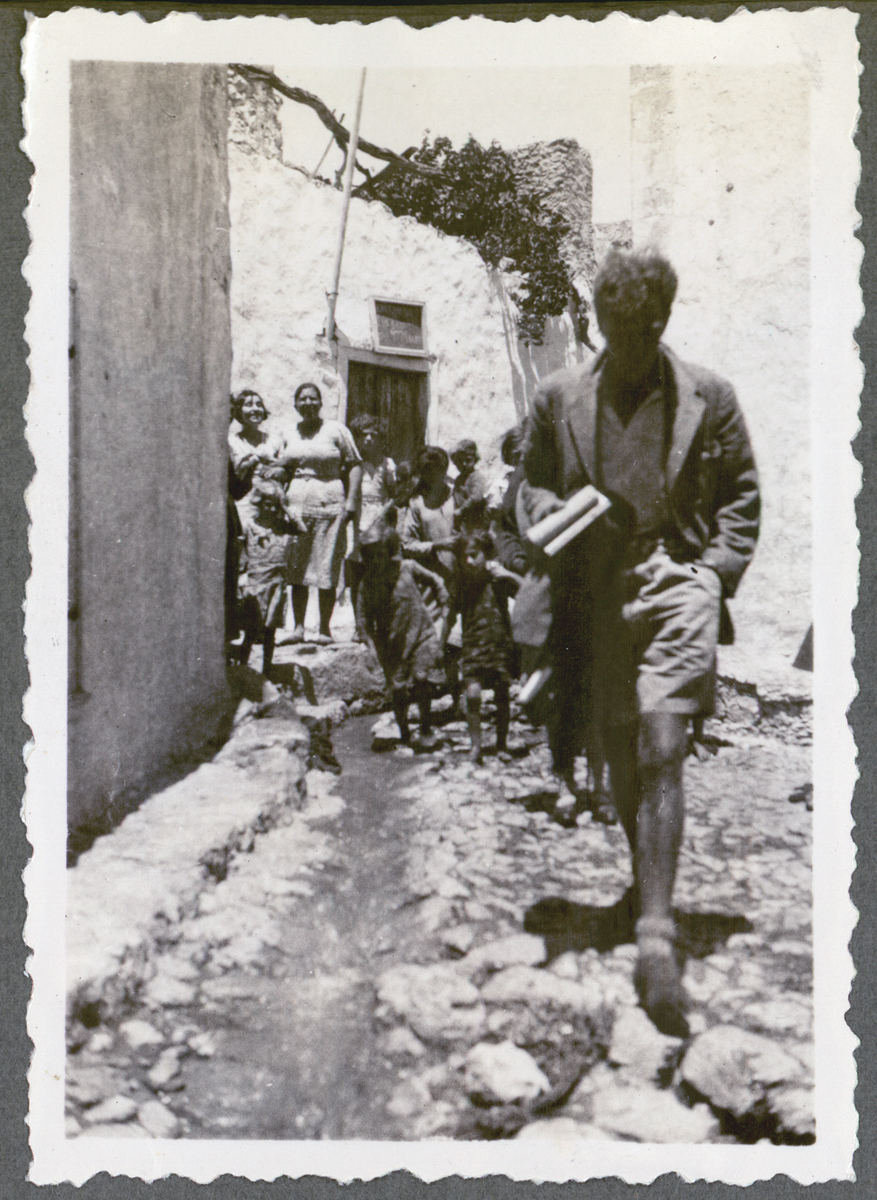About the John Pendlebury Family Papers

The John Pendlebury Family Papers cover the period from 1913 to 1964 and document the life of archaeologist and WWII hero John Devitt Stringfellow Pendlebury, his wife Hilda and their family.
Sent from Villa Mouso, Cairo, “c/o Miss Salmon”.
Sent from Villa Mouso, Cairo, “c/o Miss Salmon”.
Sent from Villa Mouso, Cairo, “c/o Miss Salmon”.
Sent from “Egypt Exploration Society, Hagg Kandil nr Der Mowas, Upper Egypt” [Amarna].
Sent from “Egypt Exploration Society, Hagg Kandil nr Der Mowas, Upper Egypt” [Amarna].
Sent from Egypt Exploration Society, Arment Camp.
Sent from Egypt Exploration Society, Armant Camp.
Sent from Cataract Hotel, Assouan [Aswan, Egypt].
Sent “c/o Dr H. Frankfort, Egypt Exploration Society, Hagg Kandil nr Der Mowas, Upper Egypt” [Amarna].
Sent from “Egypt Exploration Society, Hagg Kandil nr Der Mowas, Upper Egypt” [Amarna].
Sent from British School of Archaeology, Athens.
Sent from the British School of Archaeology, Athens.
Sent “c/o/ Egypt Exploration Fund, Hagg Kandil near Der Mowes, Upper Egypt” [Amarna].
Sent from Winstanley, Great Malvern.
The beginning of the volume contains a section of “essays 1920” by John with comments and marks in a different hand [the book was previously used as a school book]. The essays are “The Themistocles, a newly discovered Dialogue of Plato written in a late and degraded style” (a handwritten dialogue between Eumenes and Critias) and “From the Annals of John Silent” (an essay about Oliver Cromwell). The main body of the volume is a travel-log entitled “John’s Trip to Greece with Mr Cullen, Easter 1923” comprising dated extracts of letters from John to Herbert Pendlebury about the trip (2 Apr – 4 May 1923) [copied out by Herbert Pendlebury], with small photographs [added later]. Extracts from a letter written from Athens (10 Apr) describe the journey through France (Paris), Switzerland (Lausanne), Italy (Dommodosola, Milan including the Cathedral, Lakes Como and Maggiore, plain of Lombardy, Venice), Yugoslavia (Serbia, Belgrade, South Serbia [region of Yugoslavia], Skopje), Guevgueli [Gevgelija] on the border with Greece, Salonika [Thessaloníki], Mount Olympos, the Vale of Tempe, Pelion, Ossa, Thessaly including Larissa [Lárisa], and Thermopylae [Thermopílai] (including seeing Mount Oeta). An extract also mentions a postcard from Zagreb [Croatia]. Further extracts from the letter (10 Apr) also describe arriving in Athens, going to the British School at Athens, meeting [Alan] Wace; visiting the Acropolis, the Acropolis Museum, Dipylon Gate and Cemetery and the Theseion; a day trip walking from Megara [Mégara] to Minoa and Nisaea, across Salamis [Salamís] and along the coast of Attica to Pireaus; a day trip to Prasias [modern Porto Rafti, Markopoúlou, Órmos], Laureion [Lávrion], Thorikos and walking back to Athens over Hymettos [Imittós Óros] (the trip was supposed to include Sounion but their car broke down); and climbing Lycabettos [Mount Lycabettus]. Extracts from further letters describe visiting the National Museum in Athens (including descriptions of rooms and work that Alan Wace was doing in the museum); seeing Lebadea [Levádhia], Delium, Tanagra, Thebae [Thebes], Haliartos and Goulas; travelling on to Livadhia [Levádhia], Mount Helicon, Stiris Monastery (where they ate and stayed the night), Schiste, Arracova [Arákhova], and Delphi (including descriptions of the archaeological site and museum); a boat trip to Patras [Pátrai] then travelling on to Olympia (including description of archaeological site), Anduvtiana, Greka [Graíkas], Andritsana [Andrítsiana], Bassae, Kalamata [Kalámai], Sparta, Langada Gorge, Trypi [Trípi], Mistra [Mistrás], Tripolis [Trípolis], Argos [Árgos], Tiryus, Nauplia [Náfplio], Epidauros [Epídhavros], the Heraion [of Argos], Mycenae (staying at the Belle Helene, [Alan] Wace showing them tombs, describing the archaeological sites), Corinth, Eleusis [Elefsína] and back to Athens; Marousi (climbing Pentelies); the boat journey from Pireaus, stopping in Corfu, then catching the train from Brindisi to Boulogne, and arriving back in London via Dover on the 4 May.
Scenery, with a train track in the foreground. and is labelled Photograph B is of 2 young girls standing outside a building and is labelled “Two small Grecians from Thessaly”.
2 barefoot young girls standing outside a building [taken from train].
A view from a low angle, with some marble blocks in the foreground.
View of one side of the Parthenon, showing part of central structure.
Side view of monuments, including a dog/lion (?).
The acropolis is just visible in the background.
A group photograph of James Cullen with 6 local men, standing outside a building.
A group photograph of John Pendlebury with 10 local men, boys and girls standing outside a building. Taken by James Cullen. Pendlebury is at the back of the group.
Photograph taken from one corner of the building [by James Cullen].
Showing 4 columns of the Stoa, [photograph taken by James Cullen].
View of high cliffs with a crevice, from a road/path.
A mountainous scene, [taken by James Cullen].
View of Mount Parnassus, taken [by James Cullen] from a boat off the coast of [Itéa, near Delphi].
A view of the Treasury from the front, showing 2 doric columns.
Taken from the base of the stadium, showing one side of steps.
Showing a row of column bases.
Showing column bases, floor and loose pieces of marble. With trees in background, and hills beyond them.
Showing a tree-covered hill with column bases, low-walls and loose pieces of marble in the foreground.
[Taken by James Cullen], showing a tree-covered hill with column bases, stepped base of temple and lots loose pieces of marble in the foreground.
[Taken by James Cullen] showing a landscape view, looking down onto a plain. Label on reverse is partially visible, “Olympia, looking E. up Cronos hill on right the Altis” (?).
Taken from amongst trees [by James Cullen].

